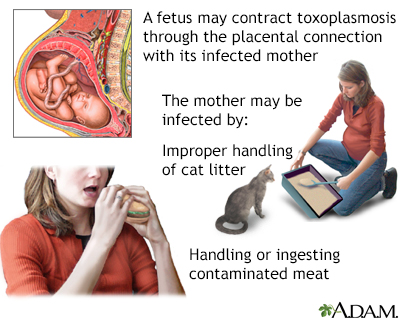| ||||||||||||||||||||||||||||||||||||||||
Toxoplasmosis
Toxoplasmosis is an infection caused by a microscopic parasite (Toxoplasma gondii).

Pregnant women are often advised not to clean cat litter boxes and to avoid sick cats. The risk of acquiring toxoplasmosis is the reason for these warnings. A woman infected while pregnant may not even know she has toxoplasmosis, but she has a 50% chance of passing the infection on to her child. During the first trimester, an infant has a 17% chance of contracting toxoplasmosis from an infected mother. Estimated to range from 1 in 1,000 to 1 in 8,000 births each year in the United States, babies born with the illness can have consequences such as blindness, hydrocephalus, jaundice, eye lesions, and neurological problems.
Other sources of the parasite that causes toxoplasmosis include:
- Raw or undercooked meat.
- Cat feces, cat litter, and soil that contain cat feces.
- Unpasteurized dairy products - cow or goat's milk.
How Do I Know I Have It?
Toxoplasmosis can be easily mistaken for a cold or the flu. You may feel tired and achy. You may have swollen lymph glands. These symptoms can last from a few days to a few weeks. The only way to make a definitive diagnosis is through a blood test.
Most infected newborn infants have no symptoms at birth, but by 20 years of age, as many as 85% of affected individuals have chorioretinitis, an inflammation of parts of the eye called the retina and choroid. Intellectual disability and learning disabilities may also become evident in children who were born with toxoplasmosis.
An infected pregnant woman can have an amniocentesis to determine if the baby is infected. If she contracts the illness early in her pregnancy, it is possible she may miscarry.
How Can I Treat It?
Your doctor may prescribe an antibiotic to treat this condition. In very mild cases, however, your doctor may advise no treatment. In an otherwise healthy person, symptoms will usually go away within a few weeks.
How Can I Prevent It?
Take the following precautions:
- Thoroughly cook all meat.
- After touching raw meat, wash your hands, any surface the meat touched, and all utensils.
- Wash fruit and vegetables before you eat them.
- Avoid raw, unpasteurized, cow or goat milk.
- Wear gloves while gardening.
- Have someone else clean the litter box.
- Wear gloves if you must change cat litter.
- Change cat litter daily.
Frequently Asked Questions
Q: How can I prevent my cat from getting the parasite?
A: Don't feed your cat raw or undercooked meat. Dry or canned cat food doesn't contain the parasite that causes the disease. You can also try keeping your cat indoors so it doesn't eat any infected material.
Q: Should I avoid cats if I'm pregnant?
A: If you have a healthy cat in your home, you should be fine if you take precautions like hand washing after touching your cat, and wearing gloves to clean out the litter box, or having someone else clean the litter box for you.
|
Review Date:
12/9/2012 Reviewed By: Irina Burd, MD, PhD, Maternal Fetal Medicine, Johns Hopkins University, Baltimore, MD. Review provided by VeriMed Healthcare Network. |




